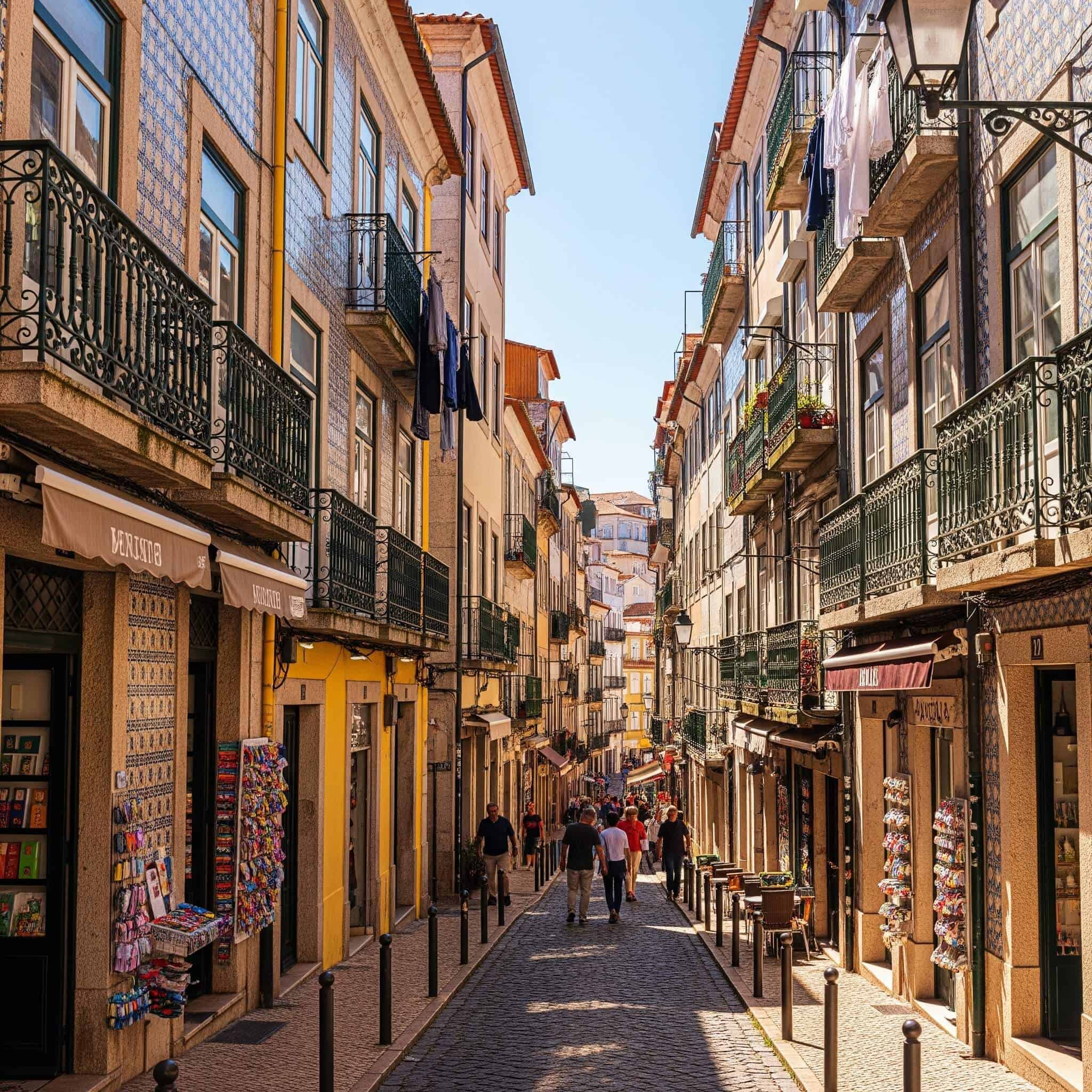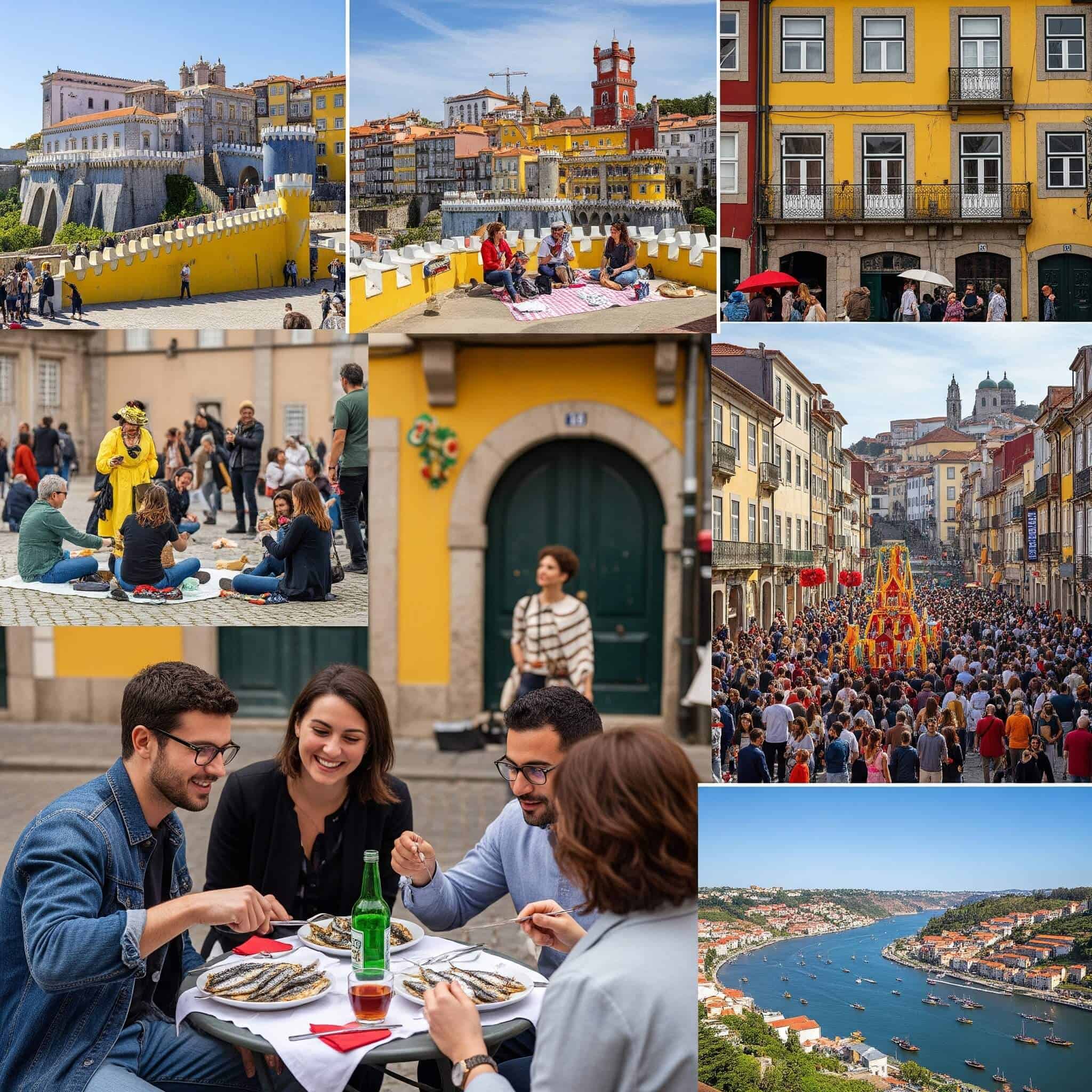25 Essential Steps for Moving to Portugal from the US: Your Complete Relocation Guide
Portugal has become an increasingly popular destination for American expatriates, with over 7,000 Americans now calling Portugal home according to recent statistics. I moved to Portugal three years ago and discovered firsthand that while the process offers tremendous rewards, it requires careful planning across multiple fronts. This comprehensive guide breaks down the 25 most critical considerations when moving to Portugal from the US, organized into five key categories to help you navigate this life-changing transition successfully.

Table of Contents
-
Immigration and Legal Requirements
-
Visa Selection Process
-
Residency Permit Application
-
NIF (Tax Number) Acquisition
-
SEF (Immigration Office) Registration
-
Legal Document Authentication
-
-
Financial Planning and Management
-
Portuguese Banking Setup
-
Tax Planning Strategy
-
Cost of Living Assessment
-
Pension and Retirement Fund Transfers
-
Currency Exchange Management
-
-
Healthcare and Insurance
-
Portuguese Healthcare Registration
-
Private Health Insurance Options
-
Prescription Medication Transition
-
Emergency Medical Services Understanding
-
Mental Health Resources
-
-
Housing and Relocation Logistics
-
Housing Market Navigation
-
Property Purchase vs. Rental Decision
-
Household Goods Shipping
-
Utilities and Services Setup
-
Pet Relocation Requirements
-
-
Lifestyle and Integration
-
Language Learning Approach
-
Community Integration Strategies
-
Educational Options for Families
-
Transportation and Mobility Solutions
-
Cultural Adaptation Techniques
-
-
How Jiffy Junk Can Help With Your Portugal Move
-
Final Thoughts
Immigration and Legal Requirements
The foundation of your move to Portugal begins with understanding and properly navigating the legal requirements. Getting these steps right from the beginning will save you countless headaches down the road.
1. Visa Selection Process
Choosing the right visa is your first critical decision when moving to Portugal from the US. The country offers several pathways for Americans including the D7 Passive Income Visa (popular with retirees), the Golden Visa (for investors), and specific visas for entrepreneurs and digital nomads.
The D7 visa requires proving stable passive income of approximately €8,460 annually for a single applicant. You’ll need documentation of Portuguese bank accounts containing sufficient funds, accommodation arrangements, health insurance, and a clean criminal record. This option has become increasingly popular among American retirees looking to immigrate to Portugal due to its relatively straightforward requirements.
Timing your visa application is crucial – you should begin the process 3-4 months before your planned move. Consular processing times vary significantly between different US regions, and appointment availability can be limited, especially during peak relocation seasons.
|
Visa Type |
Primary Applicants |
Financial Requirements |
Processing Time |
Key Benefits |
|---|---|---|---|---|
|
D7 Passive Income |
Retirees, Remote Workers |
€8,460+ annual passive income |
2-4 months |
Low financial threshold, pathway to citizenship |
|
Golden Visa |
Investors |
€280,000-€500,000 investment |
6-8 months |
Minimal residency requirements (7 days/year) |
|
D2 Entrepreneur |
Business Owners |
Business plan + sufficient funds |
3-5 months |
Ability to establish Portuguese business |
|
Digital Nomad |
Remote Workers |
€2,820+ monthly income |
1-3 months |
1-year residency with renewal options |
2. Residency Permit Application
After arriving in Portugal with your visa, you must convert it to a residency permit through an in-person appointment with SEF (Portuguese Immigration and Borders Service). This process requires careful preparation of documentation and timely scheduling, as appointments are often booked months in advance.
The SEF appointment must be scheduled within four months of arrival and requires comprehensive documentation including your passport, visa, proof of accommodation, health insurance certificate, and financial statements showing sufficient means of subsistence. Your initial permit typically lasts two years before requiring renewal.
Strategic selection of your SEF office location can significantly impact wait times. Smaller cities and towns often have shorter waiting periods than major expatriate destinations like Lisbon, Porto, and the Algarve. Many Americans immigrating to Portugal from the US find it worthwhile to travel to a less busy office rather than waiting months for an appointment in a major city.
3. NIF (Tax Number) Acquisition
The NIF (Número de Identificação Fiscal) is an absolute necessity for daily life in Portugal. You’ll need this tax identification number to open a bank account, sign a lease, purchase property, get utilities, and complete most financial transactions. Americans can obtain a NIF before physically relocating to Portugal from the US, which can significantly streamline other aspects of your move.
Three methods exist for obtaining your NIF: through a Portuguese consulate in the US, by hiring a fiscal representative in Portugal, or by visiting a Finanças office in person with your passport and address documentation. Without a NIF, you cannot proceed with most essential setup tasks in Portugal, making it one of the first documents you should secure – ideally before your physical relocation.
When I applied for my NIF, I chose to work with a fiscal representative while still in the US. I contacted a reputable Portuguese law firm that specializes in expatriate services, provided scanned copies of my passport and proof of US address, signed a representation agreement, and paid a fee of €200. Within just one week, I received my NIF certificate by email. This allowed me to immediately open a Portuguese bank account remotely and begin apartment hunting online with local real estate agents, who required my NIF for all rental applications. Having my NIF three months before my physical move gave me a significant head start on other essential setup tasks.
4. SEF (Immigration Office) Registration
Registering with SEF is a mandatory step in establishing legal residency in Portugal. The process involves submitting biometric data, verifying your documentation, and receiving your official residency card. Planning is essential as appointment availability varies significantly by location and season, with major cities often having months-long waiting periods.
SEF appointments should be scheduled 2-3 months in advance due to high demand, particularly in popular expatriate destinations like Lisbon and the Algarve. Immigration to Portugal requires patience and advance planning, especially during this step of the process.
Working with immigration lawyers can sometimes provide access to reserved appointment slots or expedited processing through established relationships with SEF offices. While this adds cost to your relocation budget, many Americans find the investment worthwhile to avoid lengthy delays in securing their legal status.
5. Legal Document Authentication
Important US documents like birth certificates, marriage certificates, and academic credentials require proper authentication before Portuguese authorities will recognize them. This typically involves obtaining an apostille certification under the Hague Convention. Some documents may also need certified translation by an approved Portuguese translator, adding another layer to your preparation timeline.
The apostille process varies by state in the US, with some states requiring multiple steps (first county-level certification, then state-level apostille), while others offer direct state department apostille services. Document authentication timing can significantly impact your move timeline – start this process at least 3-4 months before your planned relocation to account for potential delays in US government offices and Portuguese consular processing.
Moving to Portugal from the USA requires meticulous attention to document preparation. I found that creating a detailed checklist of required documents and their authentication status helped me track progress and avoid last-minute scrambling.
Financial Planning and Management
Successfully relocating to Portugal requires thorough financial preparation across multiple dimensions. From banking relationships to tax planning, getting your financial house in order before moving to Portugal will help ensure a smooth transition.
6. Portuguese Banking Setup
Opening a Portuguese bank account is essential for managing your finances locally and is required for many visa applications. Major banks like Millennium BCP, Novobanco, and Santander offer services to foreigners, though documentation requirements and account features vary.
Most Portuguese banks require in-person visits to complete account setup, though some now offer initial applications online. Maintaining both US and Portuguese accounts during your transition period is essential when moving to Portugal. This dual banking approach allows you to manage expenses in both countries while gradually transferring funds as needed.
Digital banking options like Activo Bank and ActivoBank offer English interfaces and reduced fees compared to traditional banks, making them popular choices among American expatriates. These modern banking options typically have more streamlined processes for foreigners, though you’ll still need your NIF, passport, and proof of address at minimum, with some banks requiring additional documentation or initial deposits.
7. Tax Planning Strategy
Understanding Portugal’s tax system is crucial for financial success in your new home. The Non-Habitual Resident (NHR) tax program offers qualifying foreigners significant advantages for the first 10 years, including potential tax exemptions on foreign income and reduced rates on Portuguese income.
The timing of your move impacts tax benefits – relocating in January maximizes your first year of NHR status, while moving in December means nearly a full year of tax obligations with minimal time to benefit from the program. When moving to Portugal from the US, consulting with a tax specialist before relocating helps optimize your situation and avoid costly mistakes.
Portugal and the US have a tax treaty to prevent double taxation, but you’ll still need to file US tax returns as an American citizen abroad. Understanding how specific income types are treated under both systems is essential for proper planning. Many Americans are surprised to learn that certain investment strategies that were tax-efficient in the US may not receive the same treatment under Portuguese tax law.
8. Cost of Living Assessment
Portugal offers a lower cost of living than many US regions, but expenses vary significantly by location. Urban centers like Lisbon have seen substantial cost increases in recent years, while smaller cities and rural areas remain more affordable.
Your budget directly determines viable locations – while Lisbon offers extensive English services and urban amenities, areas like the Silver Coast or inland cities like Coimbra provide substantial savings while maintaining a high quality of life. Monthly expenses for a couple in Lisbon typically include €800-1,200 for rent (1-bedroom apartment), €300 for utilities and internet, €400 for groceries, €100 for transportation, and €200 for dining out – the same lifestyle in smaller cities could cost 30-40% less.
When planning your move to Portugal from the USA, creating a detailed budget that accounts for housing, utilities, food, transportation, healthcare, and leisure activities will help you select the right location and ensure financial sustainability. It’s essential to declutter your US home first. A comprehensive decluttering guide can help you decide what to take with you and what to leave behind, making your international relocation much smoother.
|
Expense Category |
Lisbon (Monthly) |
Porto (Monthly) |
Silver Coast (Monthly) |
Algarve (Monthly) |
|---|---|---|---|---|
|
1-Bedroom Apartment |
€800-1,200 |
€650-900 |
€500-700 |
€600-1,000 |
|
Utilities (Electricity, Water, Gas) |
€120-180 |
€100-150 |
€100-150 |
€120-180 |
|
Internet & Mobile |
€60-80 |
€60-80 |
€60-80 |
€60-80 |
|
Groceries (2 people) |
€350-450 |
€300-400 |
€300-400 |
€350-450 |
|
Dining Out (8 meals) |
€200-300 |
€160-240 |
€120-200 |
€200-300 |
|
Public Transportation |
€40-80 |
€30-60 |
€20-40 |
€30-50 |
|
Healthcare (private insurance) |
€80-120 |
€80-120 |
€80-120 |
€80-120 |
|
Total Estimated |
€1,650-2,410 |
€1,380-1,950 |
€1,180-1,690 |
€1,440-2,180 |
9. Pension and Retirement Fund Transfers
Managing retirement funds across international boundaries requires careful planning. US Social Security benefits can be received while living in Portugal, but understanding how 401(k), IRA, and other investment distributions are treated under both US tax law and Portuguese regulations (including the NHR program) is essential.
The structure of your retirement accounts affects your Portuguese tax situation – Roth IRA distributions are typically tax-free in the US but may be treated differently under Portuguese tax law. Some Americans moving to Portugal strategically restructure their withdrawal strategies before moving to optimize under Portuguese tax laws, potentially converting traditional IRAs to Roth accounts or adjusting investment allocations.
Many Americans maintain US investment accounts while establishing Portuguese accounts for local expenses. This approach provides flexibility while ensuring compliance with both countries’ financial regulations. Working with financial advisors familiar with both US and Portuguese tax systems can help you develop a comprehensive strategy tailored to your specific situation.
10. Currency Exchange Management
Moving between dollars and euros requires strategic planning to maximize your purchasing power. Traditional bank transfers often involve high fees and unfavorable exchange rates. Services like Wise (formerly TransferWise) or Revolut typically offer more competitive rates for international money movements.
Exchange rate fluctuations can significantly impact your purchasing power when moving to Portugal. Some expatriates transfer larger sums when rates are favorable rather than making regular smaller transfers. Maintaining investments in both dollars and euros creates a natural hedge against currency fluctuations, providing financial stability regardless of exchange rate movements.
After losing over €300 on my first €10,000 transfer through my US bank, I developed a more strategic approach to currency exchange. I now use Wise for monthly transfers of €2,000 to cover regular expenses, which costs approximately €9 per transaction (0.45%). For larger transfers, I monitor exchange rate trends using the XE app and set up rate alerts. When the euro weakens against the dollar, I transfer larger amounts (€10,000+) to take advantage of favorable rates. Last year, by transferring a larger sum during a temporary 5% dip in the EUR/USD rate, I saved nearly €500 compared to my regular monthly transfers. I also maintain both dollar and euro investment accounts, which creates a natural hedge against currency fluctuations.
Developing a currency management strategy that accounts for exchange rate fluctuations will protect your financial stability when moving to Portugal. This might involve setting up automatic transfers for regular expenses while maintaining flexibility to take advantage of favorable exchange rates for larger sums.
Healthcare and Insurance
Healthcare considerations are paramount when relocating internationally. Portugal offers a high-quality healthcare system with both public and private options. Understanding how to access care and maintain continuity of treatment will help ensure your health needs are met during and after your transition.
11. Portuguese Healthcare Registration
Portugal’s public healthcare system (Serviço Nacional de Saúde or SNS) provides comprehensive care to residents at minimal cost. Once you have your residency permit, you should register at your local health center with your residence certificate, identification, and residency card.
Your residency status determines healthcare access – temporary residents typically need private insurance, while permanent residents gain full access to the public system. You’ll be assigned a family doctor and receive a user number that grants access to the public healthcare system throughout Portugal.
Many Americans maintain international insurance coverage during their first year while navigating the Portuguese healthcare system, providing a safety net during the transition period. Living in Portugal as an American gives you access to quality healthcare at a fraction of US costs, but understanding how to navigate the system takes time. I found that building a relationship with my local health center staff helped smooth the process considerably.
12. Private Health Insurance Options
While Portugal’s public healthcare is comprehensive, many expatriates choose to supplement with private insurance for faster access to specialists and more facilities options. Companies like Medis, MultiCare, and Allianz offer plans ranging from €40-120 monthly per person, with costs varying based on age and coverage level.
Age and pre-existing conditions significantly impact insurance costs and coverage – those over 65 or with chronic conditions often face higher premiums or coverage exclusions. Securing insurance before moving rather than after arrival is essential, as many providers have waiting periods for certain conditions or may decline coverage for pre-existing conditions if you apply after establishing residency.
Private insurance often provides shorter wait times and more English-speaking providers, which can be particularly valuable for expats in Portugal during their first years. The peace of mind that comes with knowing you can easily communicate with healthcare providers in English is worth the premium for many Americans.
|
Insurance Provider |
Basic Plan (Monthly) |
Comprehensive Plan (Monthly) |
Key Benefits |
Limitations |
|---|---|---|---|---|
|
Medis |
€40-60 |
€70-100 |
Large hospital network, direct billing |
Age restrictions after 65 |
|
MultiCare |
€45-65 |
€80-110 |
Good dental coverage, international options |
Higher copayments for specialists |
|
Allianz |
€50-70 |
€90-120 |
Excellent international coverage, English service |
Premium increases with age |
|
Advancecare |
€35-55 |
€65-90 |
Budget-friendly, good preventive care |
Limited hospital network |
|
Medicare International |
€60-80 |
€100-140 |
Designed for expatriates, covers pre-existing conditions |
Higher premiums, waiting periods |
13. Prescription Medication Transition
Transitioning prescription medications requires advance planning. Before moving to Portugal from the USA, obtain a 3-month supply of current prescriptions and document their generic names. Not all US medications are available in Portugal, and those that are may have different names or formulations.
Not all US medications are available in Portugal, potentially necessitating alternative treatments. Those with complex medication regimens should consult with Portuguese healthcare providers before moving. Bringing a detailed medical history translated into Portuguese, including current medications with dosages and generic names, facilitates smoother transitions to the Portuguese healthcare system.
Consulting with a Portuguese doctor soon after arrival helps establish equivalent medications available locally and ensures treatment continuity. I found that pharmacists in Portugal are incredibly helpful resources – they often speak English and can provide guidance on local equivalents for US medications.
14. Emergency Medical Services Understanding
Portugal’s emergency medical system operates differently from the US system. The emergency number is 112, and public hospitals provide emergency care regardless of registration status. In major cities, some hospitals have dedicated English-speaking staff.
Your location affects emergency response times and hospital access – urban areas offer quicker emergency services and more specialized facilities, while rural areas may have limited emergency capabilities. Public hospitals in Portugal operate on a triage system – non-life-threatening conditions may involve longer waits, while private hospitals (accessible with private insurance) typically offer faster service for less critical situations.
Familiarizing yourself with nearby emergency facilities and keeping your health insurance card and identification documents accessible is essential preparation when moving to Portugal. I keep a card in my wallet with my blood type, allergies, and emergency contact information in both English and Portuguese – a simple step that could make a critical difference in an emergency situation.
15. Mental Health Resources
Maintaining mental health support during and after your move is important for successful adaptation. Resources for English-speaking mental health services include the International Association for Medical Assistance to Travelers (IAMAT), which provides directories of English-speaking professionals.
The availability of English-speaking mental health providers varies significantly by region – Lisbon and Porto have more international practitioners, while smaller communities may require telehealth solutions. Cultural differences in mental healthcare approaches exist – Portuguese practitioners may have different therapeutic styles and medication preferences compared to American providers.
Online therapy platforms allow continuing with US-based therapists, while local expatriate groups often share recommendations for Portuguese providers comfortable working in English. As an expat in Portugal, I’ve found that connecting with other Americans through social media groups can be invaluable for finding mental health resources that understand both cultures.
Housing and Relocation Logistics
Finding suitable housing and managing the physical aspects of relocation present significant challenges. From navigating Portugal’s diverse real estate market to managing international shipping, these practical considerations require careful planning.
16. Housing Market Navigation
Portugal’s housing market varies dramatically by region in terms of availability, cost, and rental processes. Popular expatriate areas include Lisbon’s central neighborhoods, coastal Algarve towns, and Porto’s historic center, each with distinct price points and housing styles.
Seasonal timing affects both availability and pricing – summer months see increased competition in coastal areas, while university cities have housing cycles tied to the academic year. Many Americans find better deals and more negotiating power during off-peak seasons, with October-March typically offering more favorable conditions for long-term rentals in most regions.
Working with a real estate agent familiar with expatriate needs helps navigate the market and rental agreements, which typically require 1-2 months’ security deposit. Before searching for your Portuguese home, many Americans need to handle old furniture disposal to prepare their US property for sale or rental, creating a cleaner slate for their international move. When I immigrated to Portugal from the US, I found that having a local agent who understood both markets was invaluable in finding a property that met my expectations while staying within budget.
17. Property Purchase vs. Rental Decision
Deciding whether to rent or buy property depends on your long-term plans, financial situation, and familiarity with different regions of Portugal. Purchasing involves approximately 7-8% in closing costs and typically requires larger down payments for non-residents.
The approximately 7-8% transaction costs for purchasing (including IMT property transfer tax, stamp duty, notary and registration fees) make buying financially sensible only if staying 5+ years. Portugal’s rental laws strongly favor tenants, with significant protections against eviction and rent increases – however, this can make landlords cautious about renting to newcomers without established Portuguese credit history.
After arriving in Portugal, I initially signed a one-year lease on a two-bedroom apartment in Lisbon’s Graça neighborhood for €1,100 monthly. This allowed me to explore different areas before committing to a purchase. During that year, I discovered that I preferred the quieter pace and lower costs of Setúbal, a coastal city 40 minutes south of Lisbon. After 14 months of renting, I purchased a similar-sized apartment in Setúbal for €220,000 (compared to €350,000+ for equivalent properties in Lisbon). The purchase involved approximately €16,500 in closing costs (7.5%), including IMT property transfer tax (6%), stamp duty (0.8%), and notary fees. My mortgage required a 30% down payment as a non-EU resident at that time. Had I purchased immediately upon arrival, I would have committed to a location that ultimately wasn’t the best fit for my lifestyle preferences. The year of renting cost me approximately €13,200, but saved me from a potentially costly relocation or property sale if I had purchased in the wrong area.
Renting provides flexibility while you explore different areas, with standard contracts running 12 months with automatic renewal options. Many expatriates rent initially before committing to a purchase, which is a particularly wise approach when you immigrate to Portugal from the US and aren’t yet familiar with the different regions and neighborhoods.
18. Household Goods Shipping
Deciding what to bring to Portugal involves weighing shipping costs against replacement costs. A 20-foot shipping container from the US to Portugal costs approximately $3,000-5,000 and takes 2-3 weeks by sea. Door-to-door services from companies like International Movers or UPakWeShip handle customs clearance and delivery.
The cost-benefit analysis of shipping versus buying new varies by location – shipping makes more sense for those moving to areas with limited furniture options or higher local prices. Customs regulations allow duty-free import of personal belongings for those establishing primary residence, but proper documentation is essential – a comprehensive inventory in Portuguese, proof of residence change, and visa documentation help avoid customs delays.
Many expatriates opt to sell larger items and bring only essentials, purchasing furniture locally from stores like IKEA or Portuguese manufacturers. Many Americans find that bulk junk removal services help prepare for international moves by clearing out unwanted items before deciding what to ship to Portugal, saving on international shipping costs. When moving to Portugal from the US, I found that being ruthless about what to keep versus what to replace was one of the most challenging but ultimately liberating aspects of the process.
19. Utilities and Services Setup
Setting up essential utilities in Portugal requires your rental contract, identification, and NIF. Major providers include EDP for electricity, municipal services for water, and telecom companies like MEO, NOS, or Vodafone for internet and phone services.
In smaller towns, service providers may have limited English capabilities, making local assistance valuable – some rental agencies and property managers offer setup services for new arrivals. Portugal’s utility billing cycles differ from US systems – electricity and water are typically billed bi-monthly, with payment through direct bank debit being the standard method rather than credit card payments.
Many property managers assist with these setups, which typically take 1-2 weeks to complete. Language barriers can complicate the process, making local assistance valuable. When moving to Portugal from the USA, I found that having a Portuguese-speaking friend accompany me to utility offices made the process significantly smoother.
20. Pet Relocation Requirements
Bringing pets to Portugal requires careful preparation. Requirements include an EU-approved microchip, rabies vaccination at least 21 days before travel but not more than one year old, an EU Pet Passport or Veterinary Certificate, and a health certificate issued within 10 days of travel.
Portugal restricts certain dog breeds considered dangerous (including Pit Bull Terriers, Rottweilers, and Brazilian Filas), and the climate may not be suitable for all pets. Many rental properties have pet restrictions, narrowing housing options for pet owners – securing pet-friendly accommodation should be prioritized early in your housing search.
Airlines charge $100-200 for in-cabin pets or $200-400 for cargo hold transportation. Additionally, breed restrictions and climate considerations affect pet relocation decisions. Before moving to Portugal with pets, many Americans need to clean out their yards thoroughly, as this can be part of preparing their US home for sale or rental while planning their international pet relocation.
Lifestyle and Integration
Successfully adapting to life in Portugal goes beyond legal and logistical considerations. Building connections, learning the language, and embracing local customs will determine your long-term satisfaction with your new home.
21. Language Learning Approach
While English is widely spoken in tourist areas and larger cities, learning Portuguese significantly enhances your integration and daily life experience. Effective language learning combines formal classes (universities like Universidade de Lisboa offer courses for foreigners), language exchange meetups, daily practice apps, and immersion techniques.
Portuguese from Portugal differs significantly from Brazilian Portuguese in pronunciation, vocabulary, and some grammar – ensure you’re learning European Portuguese specifically. Younger expatriates often integrate through social activities, while older individuals might prefer structured classes – those in international enclaves may find fewer immersion opportunities than those in more traditional Portuguese communities.
Your age, learning style, and location influence which strategies will work best for you. When moving to Portugal, I found that combining formal classes with daily practice using apps like Memrise and Duolingo, plus regular conversations with patient Portuguese neighbors, accelerated my learning significantly. Even basic Portuguese opens doors to deeper connections with locals and a richer experience of daily life.
22. Community Integration Strategies
Building a social network in Portugal combines connecting with fellow expatriates and integrating with local Portuguese communities. Facebook groups like “Americans in Portugal” provide initial connections, while local organizations host regular events.
Areas with established expatriate communities like Lagos or Cascais offer easier initial adjustment but potentially less authentic cultural immersion than smaller, more traditional Portuguese towns. Portuguese social relationships typically develop more slowly than American ones, with deeper trust building over time – patience and persistence in social situations eventually yield more meaningful connections.
Volunteering with organizations creates meaningful community connections. The demographic composition of your chosen location impacts how easily you’ll integrate and the balance you’ll find between expatriate and local relationships. As one of many Americans moving to Portugal, I found that joining a local hiking group provided regular social contact with both Portuguese and international residents while exploring my new country’s beautiful landscapes.
23. Educational Options for Families
Families relocating with children have several educational pathways to consider. International schools like Carlucci American International School of Lisbon (€18,000-24,000 annually) follow American or British curricula. Portuguese public schools are free, provide immersive language learning, and offer quality education.
International schools are concentrated in Lisbon, Porto, and the Algarve, limiting options for families in other regions – some families base their location decision primarily on school access. Portuguese public schools follow a different academic calendar and daily schedule than US schools, with longer lunch breaks (often 1.5 hours) and potentially different grade placement based on birth date cutoffs.
Some families choose hybrid approaches with Portuguese schools plus supplemental English-language tutoring. School availability varies significantly by region, with international schools concentrated in major cities. When moving to Portugal with children, visiting potential schools before making final decisions can provide valuable insights into which environment will best support your child’s transition.
24. Transportation and Mobility Solutions
Transportation options vary dramatically across Portugal. Major cities have extensive public transit networks, with Lisbon’s monthly Navegante pass (€40) covering metro, bus, and train services throughout the metropolitan area. Rural areas have more limited public transportation.
Car-free living is feasible in major cities but challenging elsewhere – regional public transportation quality varies dramatically, with rural areas often having limited service. Portuguese driving differs culturally from American driving, with more aggressive urban driving patterns and different road rules – international driving permits are valid for six months, after which you must convert to a Portuguese license (which may require testing depending on your state of origin).
For car owners, importing a US vehicle involves high customs duties and conversion to European specifications; most expatriates sell their US vehicles and purchase locally. Your location significantly impacts whether car-free living is feasible. To live in Portugal as an American without a car, I’ve found that choosing a neighborhood with good access to public transportation and daily necessities within walking distance is essential.
25. Cultural Adaptation Techniques
Successful adaptation to Portuguese culture involves embracing the slower pace of life, adjusting to different daily rhythms (later mealtimes, afternoon breaks), and developing patience with bureaucratic processes. Participating in local festivals and traditions accelerates integration.
Portuguese social customs include greeting with two kisses on the cheek, maintaining a relaxed attitude toward time (punctuality expectations differ from the US), and more formal communication in professional settings. Cultural differences in conflict resolution exist – Portuguese culture tends to avoid direct confrontation, with issues often addressed indirectly or through intermediaries rather than through the direct communication style common in American culture.
Individual personality and flexibility significantly impact adaptation success, with those having previous international experience typically adjusting more easily. Setting realistic timelines for adaptation—typically 6-12 months for basic comfort and 2+ years for deeper integration—helps manage the transition psychologically. As you adapt to Portuguese culture, you may find yourself getting rid of clutter from your initial move as you settle in and discover what truly fits your new lifestyle in Portugal. When moving to Portugal, I found that keeping a journal of my experiences helped me process the cultural differences and track my adaptation progress over time.
How Jiffy Junk Can Help With Your Portugal Move
Before embarking on your Portuguese adventure, you’ll need to decide what to do with the belongings you’re not taking overseas. Jiffy Junk offers comprehensive residential cleanout services that can significantly streamline your pre-move process.
Jiffy Junk’s eco-friendly disposal approach aligns with Portugal’s environmentally conscious culture, prioritizing donation and recycling over landfill disposal. Their teams handle everything from clearing out entire homes to removing bulky furniture and appliances that won’t make the international journey. This allows you to focus on the complex logistics of your international move while ensuring your American possessions are handled responsibly.
Their “White Glove Treatment” ensures your American residence is left broom-clean after removal services, potentially helping with property sales or rental transitions as you depart for Portugal. When planning your move to Portugal, consider using furniture removal services to help clear your US home, making it easier to prepare for your international relocation without the stress of dealing with bulky items. Relocating to Portugal from the US becomes significantly more manageable when you don’t have to worry about disposing of the items you’re leaving behind.
Final Thoughts
Relocating to Portugal opens doors to a distinctly different lifestyle with tremendous benefits – from healthcare accessibility to improved work-life balance. The 25 considerations outlined in this guide provide a roadmap through the complexities of international relocation.
Successful expatriates typically establish connections with both Portuguese locals and other international residents, creating a balanced social network that supports both cultural integration and shared expatriate experiences. The first six months in Portugal often present the steepest learning curve, with most expatriates reporting significantly increased comfort and confidence by the end of their first year.
Success requires advance planning, methodical execution, and realistic expectations about adaptation timelines. Portuguese bureaucracy operates at its own rhythm, and cultural integration happens gradually. The effort invested in proper preparation pays dividends in a smoother transition to your new European home. Begin your planning early, maintain flexibility throughout the process, and embrace both the challenges and joys of building a new life in Portugal. Moving to Portugal might seem daunting at first, but with proper preparation, it can be the beginning of an extraordinary new chapter in your life.
Have you started planning your move to Portugal? What aspects of the relocation process seem most challenging to you? Share your thoughts and questions in the comments below!







